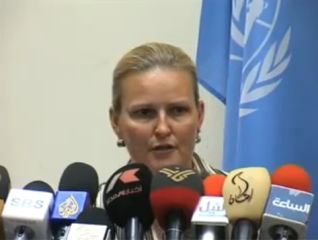UN says violence has increased in South Sudan as April elections near
March 25, 2010 (JUBA) – A top official of the United Nations office based in the semi-autonomous region’s capital, Juba, said internal conflicts in Southern Sudan have risen from last year’s levels.

“This year alone, since the first of January, we have had more than 70 incidents, just in the first two-and-a-half months of this year,” she said. 450 have already been killed and nearly 60,000 displaced by the clashes, she added.
Last year [2009] also saw a very sharp rise in such conflicts compared to the year 2008.
“What we saw last year was a very sharp rise in inter-tribal violence. There were about 100, 102 separate tribal conflicts last year, and as a result of that, there were almost 400,000 people who were newly displaced,” said Grande.
The United Nations has warned in the past that violence in the South, if not curbed, could complicate Sudan’s upcoming polls.
Grande said recent clashes have mostly been related to conflict over access to water, especially sensitive to many Sudanese because of traditional livelihoods revolving around cattle.
“A lot of [the conflict] is in the area of Unity State, Lake State, and Warrap State,” Grande added. “There has been a real concentration in those three states of intertribal trouble. Now, a great deal of that is related to the competition over scarce resources, particularly water. The cattle are very thirsty at this point, the rains have not come yet, they need to get to the water points, and water points are dried up all along those regular migration routes, and that has been one of the causes of the friction,” she explained.
Last year, Jonglei state ranked first among the most affected states by such tribal conflicts which causes ranged from cattle rustling, child abduction and competition over scarce resources. The death toll in the troubled state had reached over 1,500 people in the conflicts that involved Nuer, Dinka and Murle communities.
Officials working on election issues in the South also say violence is just one of the factors that could complicate next month’s scheduled vote.
The Carter Center released a statement late last week that cautioned that the elections might have to be slightly postponed due to logistical delays in Sudan’s preparation for the vote.
Northern opposition parties have also called for the elections to be delayed until November. Sudanese officials have rejected calls to push back the polls, from April 11.
Ballots have to be brought to most of the polling stations across the South. Many southerners live in remote areas difficult to access by road, and many roads become impassable during rainy season.
In a rally organized for his presidential election campaign in Yei town, the incumbent Southern Sudan President, Salva Kiir Mayardit said April 11 election would have to be conducted in the South even if the North postponed it.
Kiir also warned against those instigating violence and seeking to take the country back to war, warning of the consequences and restrictions of movement across to the neighboring countries.
“There are those who would want to cause trouble only to run to the neighboring countries leaving the rest to face the situation. I would not allow any body to run away. I would order for the closure of all routes leading to the neighboring countries, and I would shut down the airports so that no body leaves,” he said.
The Southern Sudan president who represents the region at the three-man Presidency in Khartoum is also expected to participate in a meeting scheduled for Thursday to discuss whether or not to postpone the elections.
Kiir had earlier told the IGAD summit in Nairobi, Kenya, that the people of Southern Sudan gave importance to the referendum scheduled for January 2011 than the forthcoming April elections.
Sudan’s elections were agreed to as part of a 2005 peace deal ending a two-decade-long civil war, during which an estimated two million people died. Also stipulated in the pact is a January 2011 referendum on Southern Sudan independence.
(ST)

Gatwech
UN says violence has increased in South Sudan as April elections near
Wow!
That is very serious! And this is why I have been recommending the postponement of this fake pre-rigged good-for-nothing elections because its fever will definitely invite more violence in the South.
Do the referendum first and see after when the elections can be conducted. Hello, Salvatore Kiir, can you discuss this seriously with President Bashir. This will avoid violence in the South that can result to delay of referendum. We better do referendum first while still in unity. Elections will cause further divisions as people like George Athor are threatening not to see Kuol Manyang again imposed on Jonglei through rigging of elections.
Hassan
UN says violence has increased in South Sudan as April elections near
The roots of the conflict should be propery investigated,not to be attributed to scape goats like say northners,People should ponder over the triggers of such conflicts. I think the triggers of these conflicts is the fragile fabric of south Sudan ,where neptoism,and tribal affliation bear the brunt.It the task of Kirr to investigate the real causes of such problems,and also it is the responsibility of you esteemed paper to tackle this ,and not to wail like a woman undergoing difficult labor.
hassan Kassala